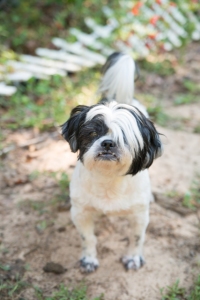December 28, 2014 / by Leann / Make A Comment / Filed under Uncategorized
 Imagine handing out treats and name tags at the front door of your home for your new dog and your resident pets. Imagine happy munches and friendly woofs (and/or meows) as they blend and bond instantly and forever.
Imagine handing out treats and name tags at the front door of your home for your new dog and your resident pets. Imagine happy munches and friendly woofs (and/or meows) as they blend and bond instantly and forever.
Then blink twice and remember that you are living in the world of reality and not in an ideal parallel universe. But armed with a set of realistic expectations, your reality may ultimately be just as ideal.
Introducing your new dog to the pets already in your home is a process. To succeed, you must start with a plan and a promise – to yourself — to be patient. The process can take anywhere from a few days to a few weeks (and in extreme cases, a few months).
To improve your chances of a happy blending of old and new, choose a dog as close as possible in temperament and activity level to the pets you already have. Dogs and cats are creatures of habit, and most dislike any disruptions in their daily lives and routines.
Some dogs are naturally more relaxed and more social than others. Some are more territorial and don’t enjoy sharing at all. Unhappy with the arrival of a newcomer, they may demonstrate their disapproval by fighting with the perceived “intruder” or by marking.
Allow your new dog to adjust to you and to his/her new surroundings by keeping him/her in a separate room with his/her bed, food, water and toys for several days. Spend as much quality, comforting time with your new arrival as possible.
Maintain your other pets’ regular routines – from feeding and pottying to exercising, playing and together times – to reassure them that nothing has changed.
Since smells are of utmost importance to animals, get them used to each other’s scent as soon as possible. One way is through that most reliable standby: food. Feed your resident pets and your new dog on either side of the door to his/her room, encouraging them to associate something pleasurable with one another’s smell.
Once this has been successfully accomplished, walk your new dog slowly through your home, room by room, allowing him/her to become familiar with its sights, sounds and smells. Keep your other pets behind the closed door of his/her room to allow your new dog a sense of safety and privacy, while promoting a further exchange of scents between them. Repeat this several times a day for a few days.
Next, use two doorstoppers to keep the door to your new dog’s room propped open just enough for all of the animals to see each other. Repeat this several times a day for a few days.
BUT remember! Every time you leave your home, leave your new dog in his/her room with the door closed.
Hopefully, when you’re ready to make the “formal” introductions, your patience and your animals’ pre-preparations will have paid off. And they will not only recognize, but also start to accept one another by what they see and smell.
Armed with the tastiest treats and most tempting toys, you can expect sniffing, approaching and walking away. Reward good behavior with praise and treats, but discourage bad behavior by promptly separating the offending parties and gently, but firmly correcting them.
Once again, patience is key. This too is a process, which may take time until the blending is successful, and your family is calmly and contentedly one.
If, however, certain problems persist, speak to your vet or consult a recommended animal behaviorist.
Author: Nomi Berger
December 17, 2014 / by Leann / Make A Comment / Filed under Uncategorized
 “There’s no place like home for the holidays,” according to the popular 1950’s song.
“There’s no place like home for the holidays,” according to the popular 1950’s song.
But for many, there IS no home. Not even for the holidays.
The “many” are those dogs and puppies, either ailing, abandoned or alone.
The “many” are those dogs and puppies, perhaps safe for today, while tomorrow remains a question mark.
With 2014 drawing to a close, we at Crossroads Shih Tzu Rescue celebrate some of the “many” we were able to save and then place in loving forever homes. And we regret that we lacked either the finances or the facilities to rescue and re-home more.
Now, as you gather with your family members and pet companions, we ask that you remember those without either families or companions. As you celebrate at home with those you love, we ask that you remember those with no home and no love.
And because this is the season for giving, we ask that you remember us and the dogs in our care with a seasonal donation. With your generous support, we can remain true to the motto that defines us: One by one… until there are none.
Won’t you please help us continue to speak for the “many”?
Won’t you please help us continue to help and to be heard?
On behalf of the “many”, we thank you and wish you a happy holiday.
Will you consider making a donation today? Visit our website http://www.crossroadsrescue.org/help/donate/ to see how you can help.
December 8, 2014 / by Leann / Make A Comment / Filed under Uncategorized
 With the approach of the holidays, everyone’s thoughts turn naturally to the happy chore of gift giving. While most people opt for the tried and true, hoping another gift certificate isn’t too impersonal or another scarf or bottle of perfume isn’t too predictable, they’re much safer choices than those being considered by some this season: the purchase of a pet.
With the approach of the holidays, everyone’s thoughts turn naturally to the happy chore of gift giving. While most people opt for the tried and true, hoping another gift certificate isn’t too impersonal or another scarf or bottle of perfume isn’t too predictable, they’re much safer choices than those being considered by some this season: the purchase of a pet.
The gift of a dog or puppy is not the same as the gift of a large, stuffed plush toy. More often than not, wrapping a red ribbon and bow around the neck of a living, breathing dog signals only one thing: trouble. Dogs are NOT toys, and should never be anyone’s holiday surprise. Unlike other holiday purchases, there are no refunds or exchanges on dogs. Only serious, possibly dire consequences. Although the idea of a dog as a gift may sound thoughtful, it is, in reality, thoughtless.
Why? Because the gift OF a dog means accepting the responsibility FOR that dog. It must be more than a well-meant whim, the desire to be different. It must be a carefully considered choice. An informed decision made by everyone involved in what may ultimately be a 10 to 15 year commitment.
Such decisions require homework and due diligence. Research into dog breeds most appropriate for your family, your lifestyle and your environment; house, condo or apartment; fenced yard or no yard. Intelligent questions asked of owners of those particular breeds and of a knowledgeable veterinarian.
Does anyone in your family suffer from allergies? Does everyone even WANT a dog? Do they understand what it means to share in the training, feeding and raising of a dog? Because adding a dog to your family not only involves time and money, it means providing that same dog with a loving and stable home.
Children should NEVER be presented with a puppy at any time of the year. Typically, they will be charmed by such a furry, little plaything that leaps and yips, squeals and nips, and rolls over onto its back for tummy rubs. For the first few days. Until the novelty wears off and reality sets in. The reality of helping care for their cute, squirming little gift. Puppies are not so cute when they have to be trained to potty outside or walked outdoors in the rain and snow.
Those well-intentioned gift givers – the parents – will now be that puppy’s full time caregivers, and, sadly, many of them weren’t prepared for this eventuality. The result: one more puppy either abandoned by the side of the road, dropped off at a pound, or surrendered to a shelter. Probably to be euthanized. Neither respectable breeders nor responsible rescue groups will either sell or adopt out a puppy or a dog as a holiday gift. They are all too familiar with the heartbreaking results of such dangerous impulse buys.
Never purchase a puppy or a dog for someone else – whether it’s a close relative or an even closer friend. The same rules apply. Only doubly so. What you consider an act of generosity may, unfortunately, be seen as an imposition. If any of them want a dog, it’s up to them to make that choice. That same, carefully considered choice and intelligent, informed decision.
To ensure that your holidays are happy, ensure that your gifts do NOT include pets.
Author: Nomi Berger
 Imagine handing out treats and name tags at the front door of your home for your new dog and your resident pets. Imagine happy munches and friendly woofs (and/or meows) as they blend and bond instantly and forever.
Imagine handing out treats and name tags at the front door of your home for your new dog and your resident pets. Imagine happy munches and friendly woofs (and/or meows) as they blend and bond instantly and forever.



 With the approach of the holidays, everyone’s thoughts turn naturally to the happy chore of gift giving. While most people opt for the tried and true, hoping another gift certificate isn’t too impersonal or another scarf or bottle of perfume isn’t too predictable, they’re much safer choices than those being considered by some this season: the purchase of a pet.
With the approach of the holidays, everyone’s thoughts turn naturally to the happy chore of gift giving. While most people opt for the tried and true, hoping another gift certificate isn’t too impersonal or another scarf or bottle of perfume isn’t too predictable, they’re much safer choices than those being considered by some this season: the purchase of a pet.